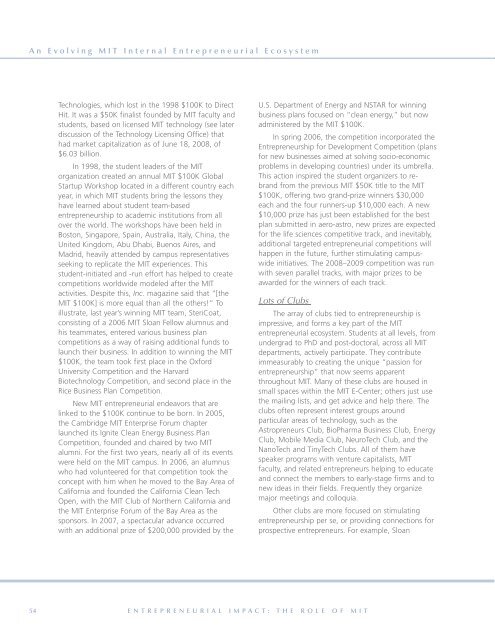mit_impact_full_report
mit_impact_full_report
mit_impact_full_report
You also want an ePaper? Increase the reach of your titles
YUMPU automatically turns print PDFs into web optimized ePapers that Google loves.
An Evolving MIT Internal Entrepreneurial Ecosystem<br />
54<br />
Technologies, which lost in the 1998 $100K to Direct<br />
Hit. It was a $50K finalist founded by MIT faculty and<br />
students, based on licensed MIT technology (see later<br />
discussion of the Technology Licensing Office) that<br />
had market capitalization as of June 18, 2008, of<br />
$6.03 billion.<br />
In 1998, the student leaders of the MIT<br />
organization created an annual MIT $100K Global<br />
Startup Workshop located in a different country each<br />
year, in which MIT students bring the lessons they<br />
have learned about student team-based<br />
entrepreneurship to academic institutions from all<br />
over the world. The workshops have been held in<br />
Boston, Singapore, Spain, Australia, Italy, China, the<br />
United Kingdom, Abu Dhabi, Buenos Aires, and<br />
Madrid, heavily attended by campus representatives<br />
seeking to replicate the MIT experiences. This<br />
student-initiated and -run effort has helped to create<br />
competitions worldwide modeled after the MIT<br />
activities. Despite this, Inc. magazine said that “[the<br />
MIT $100K] is more equal than all the others!” To<br />
illustrate, last year’s winning MIT team, SteriCoat,<br />
consisting of a 2006 MIT Sloan Fellow alumnus and<br />
his teammates, entered various business plan<br />
competitions as a way of raising additional funds to<br />
launch their business. In addition to winning the MIT<br />
$100K, the team took first place in the Oxford<br />
University Competition and the Harvard<br />
Biotechnology Competition, and second place in the<br />
Rice Business Plan Competition.<br />
New MIT entrepreneurial endeavors that are<br />
linked to the $100K continue to be born. In 2005,<br />
the Cambridge MIT Enterprise Forum chapter<br />
launched its Ignite Clean Energy Business Plan<br />
Competition, founded and chaired by two MIT<br />
alumni. For the first two years, nearly all of its events<br />
were held on the MIT campus. In 2006, an alumnus<br />
who had volunteered for that competition took the<br />
concept with him when he moved to the Bay Area of<br />
California and founded the California Clean Tech<br />
Open, with the MIT Club of Northern California and<br />
the MIT Enterprise Forum of the Bay Area as the<br />
sponsors. In 2007, a spectacular advance occurred<br />
with an additional prize of $200,000 provided by the<br />
U.S. Department of Energy and NSTAR for winning<br />
business plans focused on “clean energy,” but now<br />
administered by the MIT $100K.<br />
In spring 2006, the competition incorporated the<br />
Entrepreneurship for Development Competition (plans<br />
for new businesses aimed at solving socio-economic<br />
problems in developing countries) under its umbrella.<br />
This action inspired the student organizers to rebrand<br />
from the previous MIT $50K title to the MIT<br />
$100K, offering two grand-prize winners $30,000<br />
each and the four runners-up $10,000 each. A new<br />
$10,000 prize has just been established for the best<br />
plan sub<strong>mit</strong>ted in aero-astro, new prizes are expected<br />
for the life sciences competitive track, and inevitably,<br />
additional targeted entrepreneurial competitions will<br />
happen in the future, further stimulating campuswide<br />
initiatives. The 2008–2009 competition was run<br />
with seven parallel tracks, with major prizes to be<br />
awarded for the winners of each track.<br />
Lots of Clubs<br />
The array of clubs tied to entrepreneurship is<br />
impressive, and forms a key part of the MIT<br />
entrepreneurial ecosystem. Students at all levels, from<br />
undergrad to PhD and post-doctoral, across all MIT<br />
departments, actively participate. They contribute<br />
immeasurably to creating the unique “passion for<br />
entrepreneurship” that now seems apparent<br />
throughout MIT. Many of these clubs are housed in<br />
small spaces within the MIT E-Center; others just use<br />
the mailing lists, and get advice and help there. The<br />
clubs often represent interest groups around<br />
particular areas of technology, such as the<br />
Astropreneurs Club, BioPharma Business Club, Energy<br />
Club, Mobile Media Club, NeuroTech Club, and the<br />
NanoTech and TinyTech Clubs. All of them have<br />
speaker programs with venture capitalists, MIT<br />
faculty, and related entrepreneurs helping to educate<br />
and connect the members to early-stage firms and to<br />
new ideas in their fields. Frequently they organize<br />
major meetings and colloquia.<br />
Other clubs are more focused on stimulating<br />
entrepreneurship per se, or providing connections for<br />
prospective entrepreneurs. For example, Sloan<br />
ENTREPRENEURIAL IMPACT: THE ROLE OF MIT



